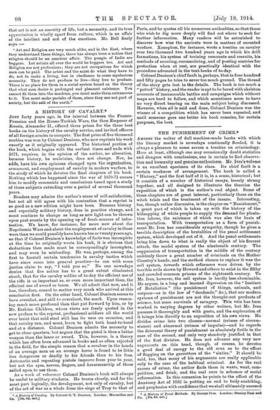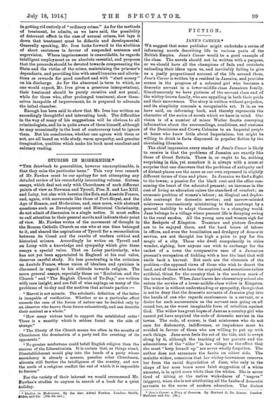THE PUNISHMENT OF CRIME.*
AMIDST the welter of dull machine-made books with which the literary market is nowadays continually flooded, it is always a pleasure to come across a treatise on criminology. Here at least, although one may occasionally doubt statistics and disagree with conclusions, one is certain to find observa- tion and humanity and genuine enthusiasm. Mr. Ives's volume is an excellent specimen of its class. Its chief fault is a certain weakness of arrangement. The book is called a " History," and the first half of it is, in a sense, historical; but it consists of a number of historical essays, loosely strung- together, and all designed to illustrate the theories the exposition of which is the author's real object. Some of these chapters are of great interest, particularly those on the witch trials and the treatment of the insane. Interesting, too, though rather discursive, is the chapter on " Banishment,' a great part of which is taken up with the history of the kidnapping of white people to supply the demand for planta- tion labour, the existence of which was also the basis of transportation. With transportation as a form of punish- ment Mr. Ives has considerable sympathy, though he gives a terrible description of the brutalities of the penal settlement system, which developed out of it. And the penal settlements bring him down to what is really the object of his fiercest attack, the model system of the nineteenth century. The suppression of transportation in the middle of the century suddenly threw a great number of criminals on the Mother Country's bands, and the method chosen to replace it was the cell system, towards which reformers were driven by the terrible evils shown by Howard and others to exist in the filthy and crowded common prisons of the eighteenth century. Te Mr. Ives, however, the cell system is hardly less abominable. He argues, in a long and learned digression on the "Instinct of Retaliation " (the punishment of things, animals, and corpses—as in the law of " deodands," &c.), that our modern systems of punishment are not the thought-out products of science, but mere survivals of savagery. This vein has been worked in varying degrees by other writers, but Mr. Ives pursues it thoroughly and with gusto, and the exploration of it- brings him directly to an exposition of his own views. He divides crime into two classes—normal (crimes of circum- stance) and abnormal (crimes of impulse)—and he regards the deterrent theory of punishment as absolutely futile in the case of the second, and only very slenderly justified in that of the first division. He does not advance any very new
on this head, -though, of course, he devotes a good deal of energy to the old crux as to the effect of flogging on the garrotters of the " sixties." It should be said, too, that many of his arguments are really applicable only to the case of the habitual criminal. As for the real causes of crime, the author finds them in waste, want, com- petition, and drink, and the real cure in schemes of social reformation. In this connexion he points to the effect of the- Anatomy Act of 1832 in putting an end to body-snatching, and prophesies with confidence that we shall ultimately succeed
• A.History of Penal Methods. By George Ives. London Stanley Petit and Co. Lies. 6d. net.] in getting rid entirely of "ordinary crime." As for the methods of treatment, he admits, as we have- said, the possibility of deterrent effect in the case of normal crimes, but lays it down that treatment must be didactic and developmental. Generally speaking, Mr. Ives looks forward to the abolition of short sentences in favour of suspended sentence and supervision. Where imprisonment is.unavoidable, he regards intelligent employment as an absolute essential, and proposes that.the proceeds should be devoted towards compensating the State and the victim of the crime, maintaining the prisoner's dependants, and providing him with small luxuries and allevia- tions as rewards for good conduct and with " start money" on his discharge. As for the abnormal (a term to which, as one would expect, Mr. Ives gives a generous interpretation), their treatment should be purely curative and not penal; while for those who, after prolonged treatment, show them- selves incapable of improvement, he is prepared to advocate the lethal chamber.
Enough has been said to show that Mr. Ives has written an exceedingly thoughtful and interesting book. The difficulties in the way of many of his suggestions wilt be obvious to all criminologists, and he is quite aware of them himself, although he may occasionally in the heat of controversy tend to ignore them. But his conclusions, whether one agrees with them or not, are all based on wide study, warm sympathy, and genuine imagination, qualities which make his book most excellent and salutary reading.











































 Previous page
Previous page